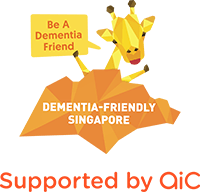Anxiety is common in persons living with dementia and can make daily life challenging. This article explores the causes and symptoms of anxiety in persons living with dementia and provides practical tips for caregivers to support their loved ones.
What is Anxiety
Anxiety is an emotional response to fear or stress. While feeling anxious is common from time to time, experiencing overwhelming fear or worry is not common.1 Anxiety differs from other related states like stress in persons living with dementia.
| Anxiety: Overwhelming worry or fear that interferes with daily life, often related to cognitive decline or changes in daily routine. |
| Stress: Short-term worry, usually in response to a recognised threat. 2 |
For persons living with dementia, anxiety often intensifies, making daily tasks and interactions harder. Anxiety is more commonly experienced by persons with Vascular Dementia or Frontotemporal Dementia (FTD) Understanding how anxiety affects them and learning how to manage it can greatly improve quality of life for both the caregiver and the person living with dementia.
Causes of Anxiety
Sometimes, persons living with dementia may display anxiety due to neurological and psychological factors. Some common causes of anxiety are listed below:
Neurological Factors
Damage to parts of the brain that involve emotion regulation:
As dementia progresses, it can affect areas of the brain that are responsible for processing emotions.
Cognitive decline:
Difficulty with memory, and spatial orientation may create fear and anxiety.
Psychological Factors
Fear of the future:
In the early stages of dementia, individuals may become anxious about their future.
Confusion and disorientation:
In later stages of dementia, anxiety may stem from feeling lost or an inability to recognise familiar faces.
Other Contributing Factors
Pain or Discomfort such as physical ailments or hunger:
Physical ailments or even hunger can trigger anxiety in persons living with dementia.
Medications:
Certain medications used for persons with dementia can have side effects that increase anxiety.
Trauma or Past Mental Health Issues:
A history of trauma, abuse, or pre-existing anxiety disorders can make individuals more vulnerable to anxiety.3
Anxiety in persons living with dementia can look different depending on the stage of the condition. In the early stages, anxiety can be due to concerns about the future and the fear of how the condition may worsen. However, in later stages of dementia, anxiety is typically rooted in confusion about the present, such as an inability to recognize one’s surroundings.
Symptoms of Anxiety
It is important to recognise signs of anxiety in persons living with dementia. These symptoms vary based on the individual’s stage of dementia and overall health.
Common symptoms may include:
- Restlessness or fidgeting
- Irritability or frustration
- Rapid heart rate or trembling
- Insomnia
- Increased confusion
- Feeling constantly ‘on edge’
Supporting Your Loved Ones with Anxiety
Establish a Calm and Predictable Environment
A consistent routine can reduce uncertainty and anxiety. Try to keep daily activities, such as mealtimes, dressing and bathing times predictable and minimise any major changes in the environment. If changes are needed, introduce them gradually. This can help your loved one feel safe, which can reduce anxiety.
Reassurance and Validation
When your loved ones with dementia expresses anxiety, do acknowledge their feelings without judgment.
- Gently acknowledge their anxiety: “We understand you’re worried, and we’re here to help.”
- Keep your tone calm.
- Redirect their attention by using activities they enjoy, like arts or games, to reduce anxious emotions.
Physical Exercises
Accompany your loved ones for regular physical activities, such as walking or gardening to reduce feelings of anxiousness. Encourage them to take part in group sessions, such as dancing or singing.
Relaxation Exercises
Consider guiding your loved ones to participate in relaxation activities, such as arts and crafts or music. Include mindfulness activities in their routines to reduce anxious emotions.
Watch this short mindfulness video to learn simple breathing techniques that can help ease anxiety.
Mindfulness Exercise for Stroke Survivors and Caregivers [English Version]
Source: Agency for Integrated Care
This video demonstrates a 10-step mindfulness exercise customised for stroke survivors, but is also suitable for anyone with affected mobility to manage stress. It takes only 15 minutes to complete all the practices in the video.
Seek Professional Help
If anxiety becomes unmanageable, consult a healthcare provider to adjust care plans or explore medication options.
It is important to note that these strategies may generally be more effective for persons living with early to middle stages of dementia. Your loved one may also want to try complementary and alternative therapies. This can include aromatherapy, acupuncture, or massage therapy.
Do consult a doctor first before participating in any of these therapies.
Adapted from Alzheimer’s Society and DementiaUK.
Conclusion
Managing anxiety in loved ones can be challenging but with patience and the right strategies, you can help reduce anxiety and improve the quality of life for you and your loved ones.
Tell us how we can improve?
- Alzheimer’s Society (2025). Anxiety and Dementia. https://www.alzheimers.org.uk/about-dementia/symptoms-and-diagnosis/anxiety-dementia.
- Barrell, A. (2020). Stress vs. anxiety: How to tell the difference. Medical News Today. https://www.medicalnewstoday.com/articles/stress-vs-anxiety
- Dementia UK. (October, 2022). Managing anxiety and depression in a person living with dementia. https://www.dementiauk.org/information-and-support/health-advice/managing-anxiety-and-depression-in-a-person-living-with-dementia/







